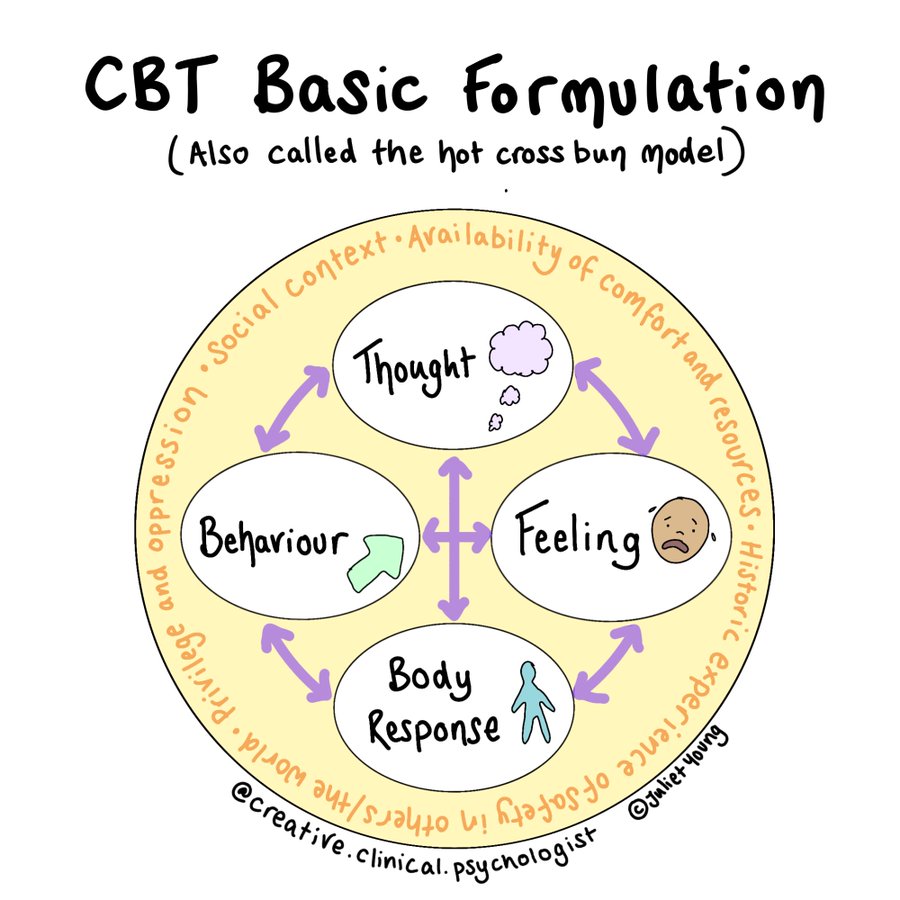Does CBT work?
31st May 2024 by Natalie
As a Clinical Psychologist, one of the most frequent questions I get asked is, "Does CBT work?" Cognitive Behavioural Therapy (CBT) is talked about a lot. It's in the newspapers, on the news, we see adverts for it on social media and most people have heard of it. It's also the therapy of choice for most NHS primary care counselling. If your GP refers you for therapy, or if you refer yourself, it's probably going to be for CBT. It's a type of therapy that works well for various psychological issues, including anxiety, depression, and stress-related disorders. But what makes CBT effective, and is it the right choice for you? More recently some seem to be falling out of love with it, why?
Understanding CBT
CBT is a structured, time-limited therapy that aims to change patterns of thinking or behaviour that are causing people distress. It is based on the concept that our thoughts, feelings, and behaviours are all connected and that changing negative thought patterns can lead to changes in feelings and behaviours. CBT is typically focused on the present and is goal-oriented, working towards specific outcomes that a person wishes to achieve.
The image below shows how our thoughts, feelings, behaviours, and bodily responses are believed to interact and impact on each other according to CBT. This way of understanding ourselves is called a 'formulation' in psychology and is one of the first things your therapist will work on with you in CBT.

How does CBT help anxiety?
Anxiety is one of the most common issues people seek help for, and CBT has been shown to be particularly effective in helping people with anxiety. When we are anxious, we often engage in catastrophic thinking or anticipate the worst-case scenarios. CBT helps us recognise and challenge these distorted or 'faulty' thoughts and replace them with more realistic and balanced ones.
For example, someone with social anxiety might believe, "If I speak up in a meeting, everyone will think I'm stupid." Through CBT, a person will be encouraged to question this belief and consider more balanced perspectives, such as, "People might actually find my ideas valuable, and even if someone disagrees, it doesn't mean they think I'm stupid."
The Role of a CBT Therapist
A CBT therapist will work together with someone to identify and change unhelpful thinking patterns. The therapist uses a variety of techniques to help someone gain insights and make lasting changes. For example, exposure therapy is particularly useful for treating phobias and obsessive-compulsive disorder (OCD), as it involves gradually exposing a person to feared situations in a controlled manner to reduce their anxiety over time.
How do we know it works?
Lots of research studies have demonstrated that CBT is helpful for a wide range of psychological needs. For anxiety particularly, CBT has consistently shown strong efficacy. A combined look at 269 individual research studies concluded that CBT is highly effective for treating anxiety and related difficulties, often producing results that are comparable to, or even superior to, medication.
CBT's effectiveness isn't limited to anxiety. It's also a well-established treatment for depression, insomnia, substance abuse, eating disorders, and chronic pain. The National Institute for Health and Care Excellence (NICE) in the UK and the American Psychological Association (APA) both endorse CBT as an initial treatment for many of these conditions.
Long-Term Benefits of CBT
One of the significant advantages of CBT is its potential for long-term benefits. Unlike some other therapies that may focus on symptom relief, CBT aims to give people skills and strategies to manage their difficulties more independently in the future. This means that even after the therapy sessions have ended, people can continue to use the techniques to cope with future challenges.
CBT and Accessibility
Another advantage of CBT is its accessibility. In a post-covid time, many CBT programs are now available online, making it easier for people to access therapy. Online CBT programs have been found to be effective for treating anxiety and depression, providing a valuable option for those who may not have easy access to in-person therapy.
Is CBT Right for You?
While CBT is highly effective, it may not be suitable for everyone. It involves someone being very active in the therapy process, including completing homework assignments and practicing techniques learned during sessions. Some people have spoken about not liking the fact that CBT supports the view that thoughts are 'faulty' and need to be changed. Occasionally this can make someone feel worse, particularly if these thoughts are particularly powerful. In these circumstances a newer kind of therapy known as Acceptance and Commitment Therapy (ACT) can feel more helpful- check back for a blog post specifically on ACT soon.
If you are struggling with anxiety, feeling overwhelmed, or finding it difficult to cope with daily stressors, CBT could be a beneficial option. Have a conversation with a qualified CBT therapist to help you determine if this form of therapy is right for you and how it can be tailored to address your specific needs. And interestingly, studies have shown that thing that holds the most weight when it comes to the effectiveness of therapy, is the strength of the relationship between client and therapist, not the type of therapy being used.
Is CBT for you? Contact me and we can have a chat.